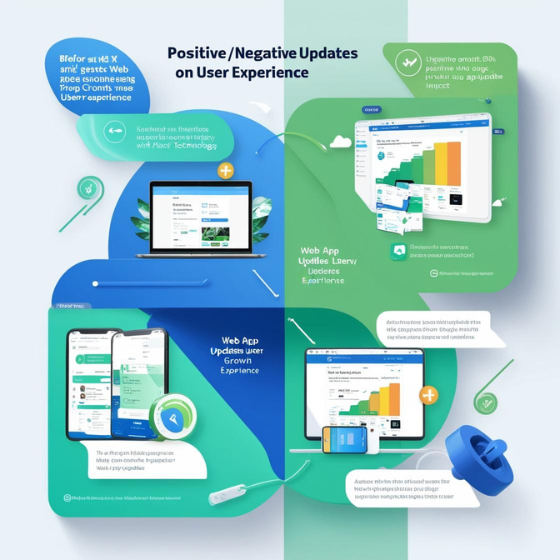The Role of Cloud Computing in Web App Development: A Game-Changer for Scalability and Efficiency
With the rapid rise of digital applications, understanding the role of cloud computing in web app development has become crucial for modern developers and businesses alike. Cloud computing enables developers to build web applications that are not only scalable and cost-effective but also highly responsive to changing user demands. By leveraging cloud technology, developers can access resources on-demand, deploy applications seamlessly, and enhance user experiences with minimal infrastructure constraints.
This blog explores the role of cloud computing in web app development, covering how it works, why it’s beneficial, and how it impacts the future of web applications.
Introduction to Cloud Computing in Web Development
Cloud computing allows developers to use internet-based servers to store, manage, and process data, instead of relying on local servers or personal computers. By utilizing cloud services, companies can operate with greater flexibility, scalability, and cost-efficiency. In the world of web app development, cloud computing is especially valuable due to its resource scalability, improved performance, and ability to handle high volumes of traffic with ease.
For businesses aiming to innovate and adapt quickly, the role of cloud computing in web app development is nothing short of transformative. This is why most modern web applications—from small startups to large enterprises—are built using cloud services to ensure optimal performance and reliability.
Key Benefits of Cloud Computing for Web App Development
Cloud computing offers a range of advantages that are particularly well-suited for web application development. Here are some of the most impactful benefits:
1. Scalability on Demand
One of the biggest advantages of using cloud computing is the ability to scale resources up or down based on demand. With traditional infrastructure, scaling requires physical server upgrades, which are costly and time-consuming. Cloud providers like AWS, Google Cloud, and Microsoft Azure offer flexible resources that can be adjusted as your user base grows.
- Elastic Scaling: Automatically adjust resources to meet demand during peak times, such as holiday seasons or marketing events.
- Cost-Efficiency: Pay only for the resources you use, reducing expenses associated with idle capacity.
2. Enhanced Data Security
Security is a primary concern for web applications handling sensitive user data. Cloud computing providers invest heavily in security, implementing measures such as encryption, access control, and regular security updates to protect data. Many cloud services also offer advanced security features, such as distributed denial-of-service (DDoS) protection and multi-factor authentication.
In the context of the role of cloud computing in web app development, security ensures that businesses can deliver applications with confidence, knowing their data—and their users’ data—is secure.
3. Reduced Development Costs
Developing web applications on the cloud can significantly reduce costs. Traditional web development requires substantial investment in physical hardware, server maintenance, and technical staffing. By utilizing cloud services, companies can avoid upfront infrastructure costs and reduce their operational expenditure.
- No Hardware Investment: Cloud services eliminate the need for costly on-premises hardware.
- Reduced Maintenance Costs: Cloud providers handle maintenance, freeing up developers to focus on app enhancements.
4. Collaboration and Remote Access
Cloud computing supports remote collaboration, making it easier for development teams to work together regardless of location. Developers, project managers, and stakeholders can access the cloud environment from anywhere, improving project communication and reducing development timelines.
The collaborative potential of cloud environments highlights the role of cloud computing in web app development as a driver of agile methodologies, which prioritize flexible and iterative development.
5. Improved Disaster Recovery
Cloud platforms offer built-in disaster recovery solutions to ensure business continuity. With data backup and redundancy, web applications can recover from system failures or data breaches quickly and efficiently. Cloud providers often have multiple data centers, meaning that if one location encounters an issue, data can be redirected to another center without disrupting services.
Real-World Applications: How Cloud Computing Enhances Web Apps
The benefits of cloud computing are exemplified in several real-world applications, illustrating the role of cloud computing in web app development as a foundational enabler for various industries.
1. E-commerce Platforms
E-commerce platforms like Shopify and Amazon rely on cloud computing to handle high volumes of traffic, particularly during peak shopping seasons. Cloud computing enables these platforms to scale resources instantly to meet demand, ensuring users experience smooth and responsive shopping experiences even during high-traffic events like Black Friday.
2. Social Media Applications
Social media apps, such as Instagram and Twitter, depend on cloud computing for rapid data processing and storage. These platforms use the cloud to store vast amounts of user data, photos, and videos, ensuring seamless access to this content for millions of users worldwide.
3. FinTech and Banking Applications
Cloud computing plays a significant role in FinTech and banking applications by ensuring data security and regulatory compliance. Financial applications benefit from cloud features like encryption and data isolation, which help to protect sensitive financial information and maintain customer trust.
These examples underscore the role of cloud computing in web app development as a means of enabling fast, secure, and highly available applications across a range of industries.
How to Choose the Right Cloud Provider for Your Web App
When it comes to integrating cloud computing into web app development, selecting the right cloud provider is a critical decision. Here are some factors to consider:
- Cost Structure: Analyze the pricing model to ensure it aligns with your budget and growth trajectory. Some providers offer pay-as-you-go, while others provide long-term commitments for reduced costs.
- Service Compatibility: Check if the cloud provider offers services compatible with your tech stack. For instance, Google Cloud is popular with applications using Kubernetes, while AWS provides extensive compatibility with various frameworks.
- Geographical Reach: For apps with a global audience, select a cloud provider with data centers close to your users. This minimizes latency and improves app performance.
- Security and Compliance: Ensure the provider meets security and regulatory standards specific to your industry, especially if you’re handling sensitive data.
Understanding the role of cloud computing in web app development also includes assessing how a provider’s strengths align with your app’s goals and requirements.
Best Practices for Integrating Cloud Computing in Web App Development
To maximize the benefits of cloud computing, consider these best practices:
1. Optimize for Cost Management
Monitor cloud expenses by setting budgets and utilizing tools to track usage. By closely managing resources, you can prevent unexpected expenses and improve cost-efficiency.
2. Use Automation
Automation is a core advantage of cloud computing. Automate routine tasks such as testing, deployment, and monitoring to improve efficiency. Continuous integration/continuous deployment (CI/CD) pipelines are also essential to agile cloud-based development.
3. Prioritize Data Security
Security best practices, such as encryption and identity management, are vital when working with cloud-based web apps. Regularly review your security settings and policies to keep data safe and compliant.
4. Test for Scalability
Scalability testing should be an integral part of cloud app development. Conduct tests to ensure your app can handle high user volumes without performance degradation.
These practices emphasize the role of cloud computing in web app development as a catalyst for scalability, security, and operational efficiency.
Conclusion
As web applications continue to evolve, the role of cloud computing in web app development is proving to be transformative, empowering developers to build faster, more flexible, and scalable applications. Cloud computing enables businesses to deliver reliable, feature-rich applications with minimal infrastructure costs, while also supporting high levels of security and remote collaboration.
For developers and businesses ready to take advantage of cloud technology, the next step is critical: choosing the right partner to support your cloud journey. Sodio’s expertise in cloud-based web app development can help you unlock the full potential of cloud technology, enabling you to create applications that are not only robust but also primed for growth.
Contact Sodio today to learn more about our cloud development services and take the first step toward transforming your app with the power of cloud computing.







